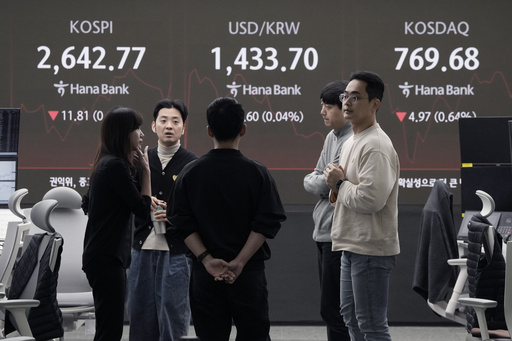BANGKOK — Global stock markets displayed a mixed response on Monday following a significant decline in U.S. equities, attributed to concerns over economic performance amid President Donald Trump’s policies.
In Germany, shares moved upward, buoyed by the outcome of a recent election that raised concerns regarding the future of Europe’s largest economy. The DAX index rose by 0.7%, closing at 22,439.17, as initial election results confirmed that the conservative faction led by Friedrich Merz emerged victorious, marking a notable surge for a far-right party that has now become the second-largest in the country.
In contrast, France’s CAC 40 saw a slight dip of 0.2% to 8,138.47, whereas the UK’s FTSE 100 managed a marginal increase of 0.1% to 8,669.45. Trading activity in Tokyo was paused for a national holiday.
In Asian markets, the Hang Seng index in Hong Kong fluctuated but concluded slightly down by 0.6% at 23,341.61. The Shanghai Composite index fell 0.2% to 3,373.03, while Australia’s S&P/ASX 200 recorded a modest gain of 0.1%, finishing at 8,308.20. The South Korean Kospi index dropped by 0.4% to 2,645.27, and Taiwan’s Taiex decreased by 0.7%, mirroring a similar trend with India’s Sensex, which also fell 0.7%.
On Friday, the S&P 500 marked its most significant decline in the past two months, decreasing 1.7% to 6,013.13, fueled by several disappointing economic reports. The Dow Jones Industrial Average plummeted by 748 points, or 1.7%, landing at 43,428.02, and the Nasdaq composite experienced a notable downturn of 2.2%, closing at 19,524.01.
Data from S&P Global indicated a troubling trend for U.S. business activity, which appeared to be nearing stagnation, with growth hitting a 17-month low, particularly in the services sector which saw unexpected contractions. Many businesses indicated rising pessimism regarding the future.
“Companies are expressing widespread concerns over the federal government’s policies, including spending cuts, tariffs, and geopolitical issues,” remarked Chris Williamson, S&P Global’s chief business economist. “Uncertainties tied to the political climate seem to be adversely impacting sales, with prices rising due to tariff-related costs imposed by suppliers.”
Ken Wattret, an economist at S&P Global, noted, “Trade weaknesses have been factored into our forecasts since December 2024, and weaker investment presents a notable downside risk.”
Another report pointed out that U.S. consumers are preparing for an increase in inflation, driven in part by potential tariffs likely to escalate prices of various imports. Consumers are now anticipating prices to rise by 4.3% over the next year, a significant uptick from their previous expectation of 3.3% inflation according to a University of Michigan survey.
Further reports indicated that the sales of previously owned homes fell short of economists’ projections last month, attributed to higher mortgage rates and rising home prices, which have negatively impacted the housing market.
Small-cap stocks, which typically mirror the economic health of the U.S. more closely than larger, globally diversified companies, experienced heavier losses relative to the general market. The Russell 2000 index was notably affected. Among individual stocks, Akamai Technologies faced the largest decline in the S&P 500, plummeting 27.1% despite exceeding profit expectations for the latest quarter.
Positive earnings reports had previously helped mitigate anxiety over persistent inflation, which could hinder the Federal Reserve’s ability to lower interest rates for further economic relief. Currently, the Fed has maintained its primary interest rate steady after considerably reducing it towards the end of the previous year. Officials at their last meeting indicated a cautious approach moving forward, given the potential inflationary pressures stemming from Trump’s proposed tariffs and immigration policies.
Lower interest rates can stimulate economic activity but may also exacerbate inflationary pressures due to increased spending.
In commodity markets, U.S. benchmark crude oil prices dipped slightly by 9 cents to $70.31 per barrel in electronic trading on the New York Mercantile Exchange, while Brent crude, the global standard, fell by 4 cents to $74.01 per barrel.
Currency-wise, the U.S. dollar appreciated to 149.50 Japanese yen from 149.24 yen, and the euro advanced to $1.0481 from $1.0462.


